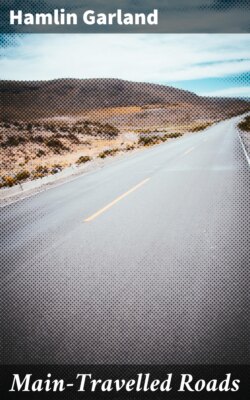Читать книгу Main-Travelled Roads - Garland Hamlin - Страница 7
На сайте Литреса книга снята с продажи.
II
ОглавлениеTable of Contents
These are advantages, and we must not be impatient of any writer who continues a short-story writer when he might freely become a novelist. Now that a writer can profitably do so, he may prefer to grow his fiction on the dwarf stock. He may plausibly contend that this was the original stock, and that the novella was a short story many ages before its name was appropriated by the standard variety, the duodecimo American, or the three-volume English; that Boccaccio was a world-wide celebrity five centuries before George Eliot was known to be a woman. To be sure, we might come back at him with the Greek romancers; we might ask him what he had to say to the interminable tales of Heliodorus and Longus, and the rest, and then not let him say.
But no such controversy is necessary to the enjoyment of the half dozen volumes of short stories at hand, and we gladly postpone it till we have nothing to talk about. At present we have only too much to talk about in a book so robust and terribly serious as Mr. Hamlin Garland's volume called Main-Travelled Roads. That is what they call the highways in the part of the West that Mr. Garland comes from and writes about; and these stories are full of the bitter and burning dust, the foul and trampled slush, of the common avenues of life, the life of the men who hopelessly and cheerlessly make the wealth that enriches the alien and the idler, and impoverishes the producer.
If any one is still at a loss to account for that uprising of the farmers in the West which is the translation of the Peasants' War into modern and republican terms, let him read Main-Travelled Roads, and he will begin to understand, unless, indeed, Mr. Garland is painting the exceptional rather than the average. The stories are full of those gaunt, grim, sordid, pathetic, ferocious figures, whom our satirists find so easy to caricature as Hayseeds, and whose blind groping for fairer conditions is so grotesque to the newspapers and so menacing to the politicians. They feel that something is wrong, and they know that the wrong is not theirs. The type caught in Mr. Garland's book is not pretty; it is ugly and often ridiculous; but it is heart-breaking in its rude despair.
The story of a farm mortgage, as it is told in the powerful sketch "Under the Lion's Paw," is a lesson in political economy, as well as a tragedy of the darkest cast. "The Return of the Private" is a satire of the keenest edge, as well as a tender and mournful idyl of the unknown soldier who comes back after the war with no blare of welcoming trumpets or flash of streaming flags, but foot-sore, heart-sore, with no stake in the country he has helped to make safe and rich but the poor man's chance to snatch an uncertain subsistence from the furrows he left for the battle-field.
"Up the Coolly," however, is the story which most pitilessly of all accuses our vaunted conditions, wherein every man has the chance to rise above his brother and make himself richer than his fellows. It shows us once for all what the risen man may be, and portrays in his good-natured selfishness and indifference that favorite ideal of our system. The successful brother comes back to the old farmstead, prosperous, handsome, well-dressed, and full of patronizing sentiment for his boyhood days there, and he cannot understand why his brother, whom hard work and corroding mortgages have eaten all the joy out of, gives him a grudging and surly welcome. It is a tremendous situation, and it is the allegory of the whole world's civilization: the upper dog and the under dog are everywhere, and the under dog nowhere likes it.
But the allegorical effects are not the primary intent of Mr. Garland's work: it is a work of art, first of all, and we think of fine art; though the material will strike many gentilities as coarse and common. In one of the stories, "Among the Corn-Rows," there is a good deal of burly, broad-shouldered humor of a fresh and native kind; in "Mrs. Ripley's Trip" is a delicate touch, like that of Miss Wilkins; but Mr. Garland's touches are his own, here and elsewhere. He has a certain harshness and bluntness, an indifference to the more delicate charms of style, and he has still to learn that though the thistle is full of an unrecognized poetry, the rose has a poetry, too, that even over-praise cannot spoil. But he has a fine courage to leave a fact with the reader, ungarnished and unvarnished, which is almost the rarest trait in an Anglo-Saxon writer, so infantile and feeble is the custom of our art; and this attains tragical sublimity in the opening sketch, "A Branch Road," where the lover who has quarrelled with his betrothed comes back to find her mismated and miserable, such a farm wife as Mr. Garland has alone dared to draw, and tempts the broken-hearted drudge away from her loveless home. It is all morally wrong, but the author leaves you to say that yourself. He knows that his business was with those two people, their passions and their probabilities.
W. D. HOWELLS
(In the Editor's Study, "Harper's Magazine").
